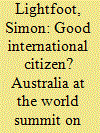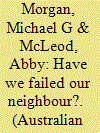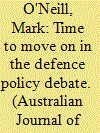| Srl | Item |
| 1 |
ID:
073363


|
|
|
| 2 |
ID:
073362


|
|
|
| 3 |
ID:
073366


|
|
|
|
|
| Publication |
2006.
|
| Summary/Abstract |
Australia has had a long connection with, and significant national interests in, the Southern Ocean and Antarctica. The Australian Antarctic Territory comprises 42 per cent of Antarctica's landmass. Australia is not only a claimant state and original signatory to the Antarctic Treaty but has played a significant role in the development of what is termed the Antarctic Treaty System (ATS). This article aims to provide an overview of Australia's key policy interests and government policy goals towards Antarctica, including its commitment to the ATS. In examining key policy objectives we note that despite continuity and development of these objectives, significant changes and challenges have arisen in the period 1984-2006. It is these challenges that will help frame Australia's Antarctic agenda over the next 20 years and beyond.
|
|
|
|
|
|
|
|
|
|
|
|
|
|
|
|
| 4 |
ID:
073365


|
|
|
|
|
| Publication |
2006.
|
| Summary/Abstract |
In recent years there has been increasing use of the term 'empire' to describe US primacy in world affairs. This should not be viewed merely as an indictment of US power: there are genuine insights to be gained from the study of imperial formations in contemporary politics. Yet there remains confusion and disagreement over the true meaning of 'empire'. Progressive schools of thought in the academic discipline of international relations can facilitate a fresh understanding of 'empire'-one that is suited to the complexities of the contemporary global scene.
|
|
|
|
|
|
|
|
|
|
|
|
|
|
|
|
| 5 |
ID:
073367


|
|
|
|
|
| Publication |
2006.
|
| Summary/Abstract |
Australia has often been identified as a middle power in foreign policy terms. This article assesses the worth of the concept in understanding the role of Australia in global environmental governance. Using a case study of the role played at the World Summit on Sustainable Development, it assesses whether Australia conformed to a classic middle power role, building coalitions as a 'good international citizen' or whether its role was more like a veto state, preventing positive change. This is done via a reflection of Australia's Summit priorities and an assessment of its impact over the Summit outcomes. The article shows that Australia was able to offer leadership in certain specific areas, but overall domestic policy preferences, a growing mistrust of multilateralism, and a strong defence of the national interest meant that Australia played the role of a veto state, often in coalition with the United States of America.
|
|
|
|
|
|
|
|
|
|
|
|
|
|
|
|
| 6 |
ID:
073364


|
|
|
|
|
| Publication |
2006.
|
| Summary/Abstract |
In April 2006, rioting broke out in Honiara, Solomon Islands, following the parliamentary election of Snyder Rini. Occurring almost three years after the commencement of the Australian-led Regional Assistance Mission to Solomon Islands (RAMSI), the riots sparked intense deliberations about the nature of Australia's engagement with Solomon Islands and the success, or otherwise, of RAMSI. Within the context of discussions about state-building in Melanesia, this article seeks to outline challenges to the success of RAMSI. Ultimately, we argue that successful state-building in Melanesia is highly dependent upon awareness of local conditions, rather than simply the application of international best practice. Moreover, we suggest that unless the current approach is modified to accommodate local circumstances-including social and political structures and locally defined needs and desires-the existing growth of anti-RAMSI sentiment will continue to escalate. In conclusion, we offer policy-relevant suggestions aimed at assisting mission stakeholders to improve RAMSI's viability and impact.
|
|
|
|
|
|
|
|
|
|
|
|
|
|
|
|
| 7 |
ID:
073361


|
|
|